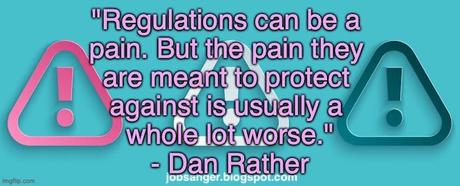
The following discussion of regulations is by Dan Rather and Elliot Kirschner:
Thankfully, we make it through most days without something going horrifically wrong.
We drive to the store and don’t get into an accident.
We sleep through the night without the smoke detector sounding an alarm.
We are out for a walk and CPR is never needed.
Most moments of life are not a crisis or a catastrophe. But some moments are, and when crises happen, we are much safer if we are prepared. So we invest in all kinds of measures to do just that. The math can be a matter of life and death: The one time we do need protections, we better have them. Because if we don’t, by that point it will already be too late.
Our buildings, cars, airplanes, food, roads, appliances, and almost everything we come into contact with each and every day are safer than they once were because of government regulations.
We have far too much evidence that a marketplace free of government involvement at some level will prioritize profits over protection. There is no way of knowing how many people are alive and healthy today who would not be had it not been for regulations.
But the government doesn’t protect us just from the physical things we use and consume; it also plays a key role in defending us against natural disasters, disease, and, yes, bank runs. The idea behind regulations is not primarily to mitigate the damage once a catastrophe is unfolding — it’s to prevent that catastrophe from occurring in the first place.
To go back to an example from above, seatbelts and airbags will save more lives than Jaws of Life (the tools first responders use to extract victims from car crashes).
But regulations also come with a Catch-22 — when they work, that work is often invisible. It’s the absence of action, the prevention of tragedy. How do you count those? This phenomenon can lull us into complacency. So in good times, there is an understandable instinct to roll safeguards back. Who wants to pay for umbrellas when it’s not raining?
The folly of this mindset is now on tragic display. We saw it in the toxic train derailment in Ohio, and we are seeing it in the run on banks. Thankfully we have the Environmental Protection Agency and federal deposit insurance to try to clean up these two particular messes. But wouldn’t it be better if the train hadn’t derailed? Or the Silicon Valley Bank had remained solvent?
It is disappointing but as predictable as the sun rising that the bankers and corporate titans who have previously railed about how “big government” stifles innovation now sound like a bunch of latter-day Karl Marxes arguing for an influx of government action to protect the world from what they helped unleash.
To be sure, some regulations are unnecessary, misguided, or outdated, across a host of industries. We should constantly be assessing what is necessary. But “let’s hope for the best” is not the way to do it.
We also need to understand a delicate balance between safety and utility. If we limited speed to 10 miles an hour on our highways, the roads would be a lot safer. That would be great. On the other hand, it would also take us a very long time to drive even moderate distances. How do you weigh this tradeoff?
Finally, it’s a lot harder to evaluate risk when it is theoretical. That’s why in the aftermath of a crisis there is often a groundswell of support for the government stepping in with both the short-term and the long-term objectives. The most immediate need is to stem the damage. Then the goal should be to try to prevent that damage from ever happening again.
In most cases, the only entity that can really do that in our society is the government. And it has to be big enough and powerful enough to have the resources and jurisdiction to step in when needed.
These current bank crises will pass, but hopefully we can take the lessons learned and stretch them a little farther, toward some meaningful action.
Regulations can be a pain. But the pain they are meant to protect against is usually a whole lot worse.

